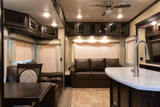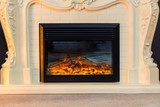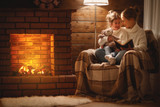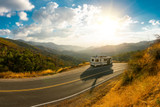The Battle Between Camping and RVing: Who Will Win the War?
The fairy tale Beauty and The Beast may be the “Tale as Old as Time,” but the debate over which is better to enjoy the outdoor world – tents or campers – wages on.It is hotly debated on the Internet and most likely in hushed conversations around campfires in campgrounds around the nation. There are obvious differences, of course, and even those who prefer their outdoor experiences to even be more rustic with only a hammock to sleep in.
A travel trailer, camper or motor home allow the users to have an at-home experience while still getting out to enjoy the hiking and biking trails, fishing or hunting. Often, die-hard tent campers relent to giving up their sleep-on-the-ground outdoor experience for the more comfortable digs of a camper or RV as they get older or have family members who need the extra comfort an RV offers.There’s something to be said for waking up without having to crawl to the entrance of a tent to stand up or to not having to find a flashlight to light the way at night into the woods when your bladder calls.
Tent camping puts people together in a confined space. That may be a good thing for family togetherness, but it is likely going to lead to everlasting harmony. People value their personal space and, in a tent, that’s difficult to come by.And if all you need is shelter from the elements, a tent is more economical, more portable and serves the purpose.
An RV allows a little more breathing room. It’s not the same as a 1,000 square-foot home, but everyone in the family can have a place to go to get out of each other’s way and find their own pocket of air to breathe. Fences may make good neighbors but personal space can keep family friction to a minimum.
You can go places with a tent that you cannot with an RV. A tent can be strapped to a backpack and off you go, carrying your home for the night on your back. Anyone with a desire to hike the entire length of the Appalachian Trail, for example, has to be OK with camping in a tent.
Much of the debate centers on the personal definition of “getting away from it all.” If the “it all” refers to the day to day routine of working, going to school, or other responsibilities that pepper life at home, then a tent or an RV can meet the need. If the “it all” refers to modern conveniences, then the RV’s electricity, indoor bathroom, shower, kitchen appliances, air conditioning and wifi connections do not meet the test. While disconnecting from the outside world via technology is still possible in an RV, it is almost guaranteed in a tent.
Relaxing is different than “getting away from it all.” Relaxing to one person may be enjoying a cup of coffee and watching the sun rise over the Atlantic Ocean. To another, it may be sitting around a campfire in the middle of a National Forest simply listening to the crackle and pop of wood burning. Others find relaxation at the end of a strenuous hike through a canyon to the top of a waterfall or from roaring down the ATV trails, splashing through mud and climbing over rocky ridges. Someone else may find relaxation sitting under a tree reading the latest novel, painting in the Plein air style, or creating stanzas of poetry as the breeze blows through the leaves.
All of these scenarios meet the challenge of being relaxing and it doesn’t matter whether it's accomplished from sleeping in a tent or settling into an RV. Tent camping and RV camping are different in many obvious ways, but when it comes to each’s ability to recharge a person’s spirit, either way works well.
Camping has always been an economical way for families to vacation. It requires very little equipment; everything that is needed can likely fit in the trunk of a car, and the fuel expense incurred to get from home to the camping site is less than it would cost in an RV. Going camping requires packing the supplies, loading the family and hitting the road. When arriving at the campsite, it may take only about a half-hour or less to put up the tent and unload supplies.
Setting up camp in an RV takes a longer. Fewer miles per gallon means RVers pay more to get to their destination and are also paying more for their campsite, in most cases. The initial investment in the RV is much, much more than the investment in camping supplies and requires insurance coverage and lots of room to store the rig when not in use.
The RV advantage, however, may not be apparent right away – at least not until the weather takes a turn. Tent campers who have had the experience of waking up to water in their tent because a rainstorm flooded the camping area or those who have had to fight the wind while setting up the tent realize it’s a lot easier to weather a storm inside an RV.Tents can leak. Camping season is often limited by weather; it’s too hot or too cold to camp in a tent, but an RV extends that season, even making it a four-season adventure.
A list of tent camping cons is longer than the list of RV cons. For example, food storage is more involved when tent camping, especially for items that need to be kept cold. That is not a concern on the RV con list. Showering and washing clothes are limited when tent camping to only those times in which camp is set up in a campground. For RVers, showering and washing clothes can be done anytime, in a campground or not.
Simple campsite chores like washing dishes are easier in an RV. Cooking over an outdoor fire creates wonderful memories, but menu choices are limited. An RV’s fully equipped kitchen provides more variety of meals.And, there is no need to suffer through trail mix and granola bars when rainy weather extinguishes your campfire if you are in an RV.
Finding shade at campgrounds in sunny areas is a problem for tent campers. It can get very hot inside that tent. Those in an RV don’t need to worry about shade; the air conditioning unit or awning can provide a welcome respite from the sun.
The final argument in favor of RV camping is that you don’t have to choose a camper lifestyle over tent camping. You can easily do both. Setting up the RV as a base camp and taking your tent and gear out on the trail gives you the best of both worlds. You can experience the wilderness and know you have a welcoming and comfortable set up to return to after days of roughing it.Or, set up a tent alongside your RV to let the kids have their own camping experience.
Lois Tomaszewski is an award-winning writer and former newspaper editor.
Recent Posts
-
4 Tips for Securing RV Furniture While Traveling | RecPro
How To Secure RV Furniture There are few things that beat going out on an adventure with an RV …Apr 11th 2024 -
Can You Put Regular Furniture in an RV?
Can you put regular furniture in an RV? Many new and old RV owners ask themselves this qu …Apr 8th 2024 -
Are RV Electric Fireplaces Safe
Being Safe in Your RV with an Electric Fireplace Safety is always going to be one of your highest …Apr 4th 2024 -
How To Install An RV Fireplace
A Warm Addition to Your On-Wheels: The DIY RV Fireplace Installation Guide Many RV enthusiasts ask …Apr 1st 2024 -
Essential Grilling Gear Every RVer Needs
Whether or not you consider yourself a pitmaster or grillmaster, if you’re out on the road with y …Mar 18th 2024 -
Fun and Interesting Places to Visit That Aren’t a National Park
One of the big destinations when RVing is to go to National Parks. You want to get back to nature, h …Mar 4th 2024







